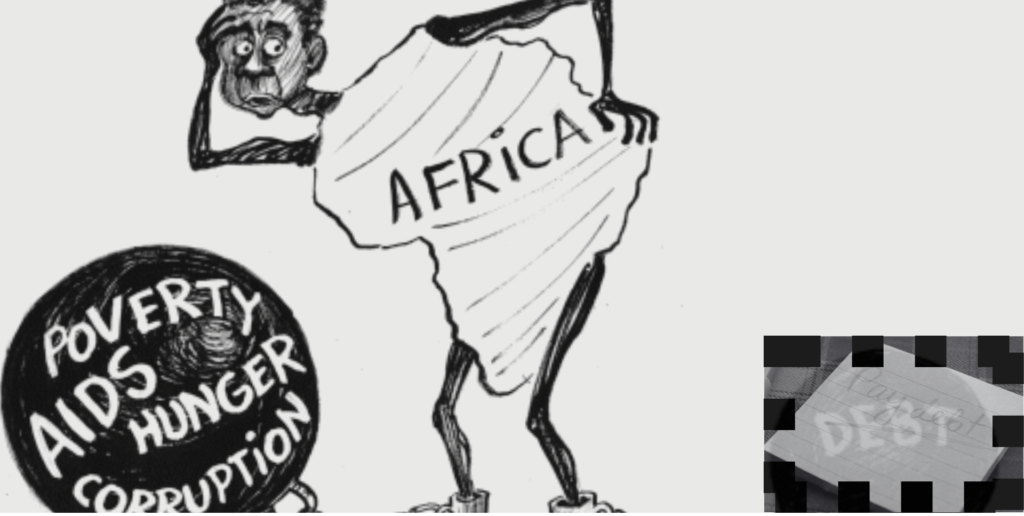
By Olakunle Agboola – African nations have faced a persistent burden for decades: external debt. This weight, often accrued under difficult terms from Western countries and financial institutions or with significant dependency on Chinese credit, has stifled growth and locked many countries in cycles of economic servitude. Servicing debt diverts valuable resources that could otherwise be allocated to healthcare, education, and infrastructure. The consequence is a cycle that perpetuates poverty and dependency, undermining the potential for self-sustained development. However, there is a way out, and it hinges on one powerful factor: good governance.
The Reality of Debt in Africa
Africa’s collective debt is not just a matter of numbers; it represents the deep-rooted historical and economic structures that have kept the continent beholden to external influences. Nations like Zambia, Ghana, and Kenya have faced repeated instances of economic distress due to debt obligations. These debts often come with conditions that limit policy autonomy and force governments to adopt strategies that may not align with local needs or long-term national interests.
When nations rely on external borrowing, they sometimes implement austerity measures that stall growth. These measures, dictated by international lenders, prioritize debt repayment over development projects, causing economic stagnation and public discontent. As African economies struggle to fulfill these obligations, new loans are often taken to pay off old ones, creating a revolving door of dependency.
A Model of Change and the Promise of Good Governance
What sets apart countries that overcome economic adversity from those that remain trapped is often the quality of their governance. Good governance is more than just administration; it involves transparency, accountability, strategic resource management, and the prioritization of national interests over personal gain. Effective leadership can unlock a country’s potential by making bold decisions that focus on long-term development rather than short-term appeasement of creditors.
Mali’s efforts to become debt-free under its military leadership provide an illustrative example for other African nations on the importance of strategic governance. By renegotiating contracts, managing resources efficiently, and curbing corruption, Mali is prioritizing the financial health of the nation. This approach underscores how strong, decisive leadership can redirect a country’s trajectory, transforming economic challenges into opportunities for growth.
Key Strategies for Achieving Debt Freedom
One of the most significant ways African countries can achieve debt freedom is by ensuring their natural resources are managed effectively. The continent is rich in minerals, oil, gas, and agricultural potential, yet these resources are often exploited under contracts that do not benefit the local population. Countries need to renegotiate these contracts to ensure a fair share of profits stays within their borders. Transparency in resource management, coupled with strict anti-corruption measures, can significantly boost national revenues.
For instance, renegotiating mining contracts and requiring foreign companies to adhere to terms that guarantee a larger percentage of profits for the state can generate substantial revenue. This approach, taken by leaders with foresight, can finance development projects without resorting to external borrowing.
African nations must bolster their tax systems to increase domestic revenue. Improving tax collection mechanisms and expanding the tax base helps ensure that public funds are available for development. Efficient tax administration can curb evasion and reduce reliance on external funds. This move requires not only technological investment but also political will and public trust in government institutions.
The African Continental Free Trade Area (AfCFTA) represents a unique opportunity for the continent to build economic resilience. By fostering intra-African trade, countries can reduce their reliance on exports to Western countries and strengthen their local economies. Regional trade partnerships enhance market access and stimulate diverse economic activity, leading to sustainable growth.
The Role of Leadership in Transforming Economies
The cornerstone of debt-free progress in Africa lies in its leadership. Leaders who demonstrate integrity and prioritize national interests can inspire trust and galvanize public support for difficult but necessary reforms. Leaders must possess the vision to look beyond short-term gains and the fortitude to implement policies that align with long-term national goals.
Good governance also means reducing corruption, which diverts public funds and undermines economic stability. According to reports, Africa loses billions annually due to corruption. Leaders who enforce strict anti-corruption policies can channel resources toward development and ensure that revenues serve the public.
Moving Away from External Dependency
The narrative that African countries must depend on loans from Western powers or China to develop is not set in stone. With the right policies and leadership, African nations can chart a course toward financial independence. This requires breaking away from the pattern of relying on aid or borrowing with stringent conditions that benefit the lender more than the borrower.
Economic strategies should focus on value addition within African industries. Instead of exporting raw materials, countries could develop manufacturing sectors that create jobs, increase national income, and stimulate local economies. For example, processing minerals and agricultural products locally before exporting can significantly increase revenue and reduce trade imbalances.
Education and Human Capital Development
Investment in education and human capital is critical for sustainable growth. A well-educated workforce is more innovative, productive, and capable of driving economic diversification. Governments that invest in quality education systems create a foundation for long-term growth that can support debt repayment and economic independence.
Building Trust and National Unity
Good governance also involves fostering national unity and trust between the government and its citizens. Policies that are inclusive and designed with input from a wide range of stakeholders ensure that economic strategies are more effective and have widespread public support. When citizens believe in their leaders’ integrity and vision, they are more willing to endure the short-term sacrifices necessary for long-term prosperity.
A Call to Action
Mali’s pursuit of becoming debt-free shows that it is possible for African nations to break free from the chains of debt dependency. This is a call to action for other African leaders to focus on strong, strategic governance that prioritizes national interests and sustainable growth. Africa’s potential is vast, and with leaders who can harness this potential, the continent can move toward an era where debt is no longer a constraint but a conquered challenge.
By fostering good governance, embracing transparency, and managing resources strategically, African nations can lay the groundwork for debt freedom and economic resilience. The journey may be long and filled with challenges, but the rewards—freedom, growth, and prosperity—are worth the effort.









